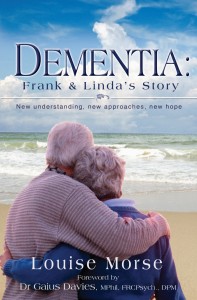
This was written at a time when a better understanding of how the brain works and how it is affected by dementia were emerging, and more empathic ways caring for people with dementia had proven their value. These new approaches included a deeper knowledge of the indivdual with dementia and their core beliefs, and how good care helps the person to maintain a sense of identity. It focuses on the three important aspects of dementia care – living, helping and spiritual support. The book is filled with pointers and information, all set within a Christian context.
Some readers comments were:
‘If dementia is a ‘no go topic’ for you as an individual or a clinician (whatever your speciality), or both, then read this book! It provides the corrective re-think you need. Written by a cognitive behavioural therapist, it presents an explicitly Christian perspective structured around a married couple’s ‘case history’. Clearly, practically and movingly, the day-to-day and sequential issues (and possibilities) for relationship, caregiving, communication, ‘personhood’, identity and support (practical, emotional, spiritual are covered …Firmly rooted in the sanctity of ‘God’s image’, replete with practical advice and useful links, this is a resource for individual caregivers, health professionals, church families, and all thinking Christians.’ (Cameron Swift is a consultant physician and professor of healthcare of the elderly.’
‘Good care is something that comes from the heart, not the system. This sets the theme of this remarkable book that challenges everyone across the caring spectrum’. Revid Chris Wood, Hospital Chaplain.
‘Every GP should read this book!’ Dr Judy A McLaren, Family Doctor.
Chapters outline:
Introduction – A Sense of Purpose
- A day at a time
Linda’s life before and after dementia, keeping Frank happy by reversing into the neighbour’s driveway.
- Truth and grace
Finding meaning in behaviour, and describing a new approach to care
- Could it be dementia?
Early symptoms of dementia, and coping after a diagnosis, and how churches can help.
- Honouring ‘Thou’
Focusing on the person, understanding the ‘language’ of dementia
- Dealing with the Diagnosis
Coping with the news, developing resilience, and support that helps.
- Practical steps
Making the home safe; risk assessment, assistive technologies, practical advice.
- Tipping Points
When specialist residential care is best for the person with dementia and their caregivers, and helping with ‘responsive’ behaviour.
- Passport to Good Care
A detailed look at a new method of caring that is relational and involves the whole person and their families.
- Minding the care and funding maze
The difference between nursing and personal care, applying for funding, the importance of safeguards such as Power of Attorney.
- Choosing a care home
Knowing what to look for, the things that really matter.
- Giving spiritual support
The Holy Spirit communicates to the person’s spirit, and the power of the Scriptures and spiritual support.
- Letter from America
A chapter describing the system in America and a daughter’s experience with her father.
- Looking after one another.
God designed human beings to live in relationship with one another, and the importance of building one another up.







